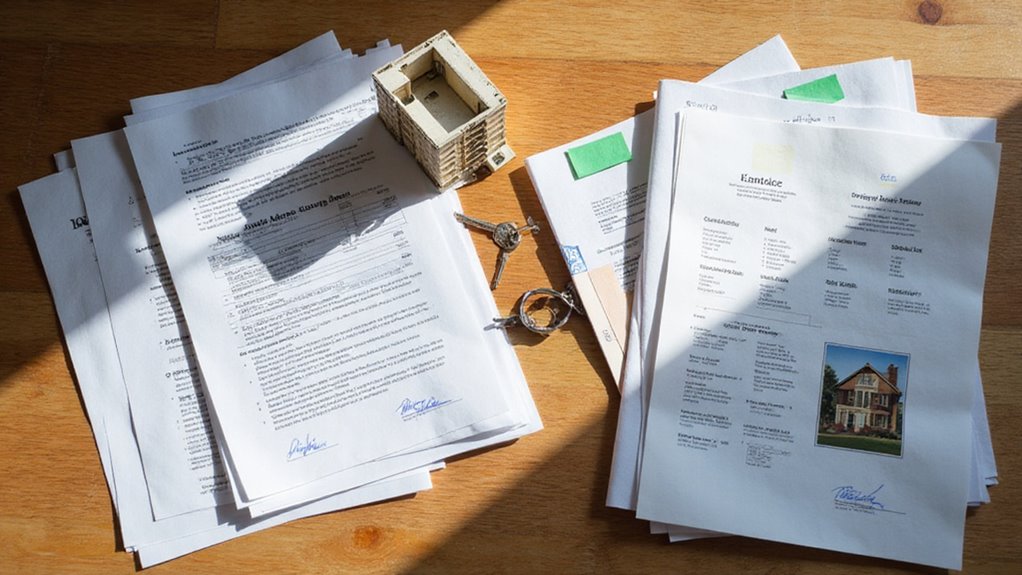Deciding to sell a property can be confusing. Rules and taxes are different for rental properties and primary homes. Many owners do not know these differences until it is too late.
This confusion can lead to costly mistakes. You might pay more tax or face legal issues. Not knowing the rules can hurt your profit.
Selling a rental property is different from selling your primary home because of tax rules, tenant issues, and legal requirements. You can avoid surprises by learning these differences now. Being prepared helps you make the most money. This blog explains the key differences and gives you tips to sell your property without stress or costly errors.
Key Takeaways
- Selling a primary residence often qualifies for capital gains tax exclusion, while rental property sales are subject to capital gains and depreciation recapture taxes.
- Rental property sales require handling tenant laws, notice requirements, and lease disclosures, making the process more complex than selling a primary residence.
- Emotional attachment to a primary residence can affect pricing and negotiation, unlike the typically business-focused sale of a rental property.
- Rental properties may take longer to sell due to tenant occupancy and additional documentation, while primary residences can usually be marketed and shown more easily.
- Accurate recordkeeping and legal compliance are crucial for both, but rental property sales involve extra financial, tax, and legal considerations.
Understanding the Legal Definitions

A primary residence is the home where you live most of the year. A rental property is a place you rent out to tenants through a lease. The law treats these two property types differently.
Your tax rules and paperwork depend on whether you sell a primary home or a rental. If you manage a rental property, you must follow landlord-tenant laws. You also need to keep the property in good shape until you sell it. When selling a property owned by more than one person, it’s important to understand the legal implications of joint ownership to ensure all necessary parties are involved in the sale.
Selling a primary residence is usually simpler than selling a rental. If you understand these differences, you can avoid legal trouble. You will also be better prepared for the financial effects of your decision. When selling either type of property, no repairs or maintenance requirements can be a major advantage if you choose to work with a cash home buyer.
Ownership and Occupancy Requirements
A primary residence is the main home where you live most of the time. To qualify as your primary residence when selling, you must have lived there for at least two of the last five years. You can prove this with documents like utility bills or your driver’s license. For sellers who want a fast, hassle-free solution, companies that buy houses for cash can simplify the process regardless of whether the property is a primary residence or rental.
A rental property is usually a home you rent out to others. You need to show lease agreements or records from a property manager to prove this. If you do not have these records, selling may be more difficult.
Meeting these requirements is important for a smooth sale. Proper documents help you show the true use of your property. If you have questions, a real estate professional can guide you. For both types of properties, maintaining accurate records of your ownership and use can help minimize tax obligations and avoid issues during the sale process.
Tax Implications and Capital Gains

The IRS taxes profits from selling property as capital gains. Tax rules are different for your main home and rental properties. If you meet certain conditions, you may avoid some taxes when selling your main home.
Section 121 lets you exclude up to $250,000 of gain, or $500,000 if married filing jointly, from taxes. You must have owned and lived in the home for at least two out of the last five years. Rental properties do not qualify for this exclusion. If you work with cash buyers, you may benefit from a faster and more predictable transaction process compared to traditional sales.
If you sell a rental property, you pay capital gains tax on your full profit. The tax rate depends on your income and how long you owned the property. Heirs who inherit property usually get a stepped-up basis, which can lower their future taxes.
You should always check the latest tax rules before selling. Consult a tax professional if you are unsure about your situation. Tax laws can change and may affect your sale.
If you own property in Kansas City and surrounding areas, you may be able to receive a no-obligation cash offer and sell quickly without traditional listing hassles.
Depreciation Recapture on Rental Properties
When you sell a rental property, you’ll need to account for depreciation recapture, which can trigger additional tax liability. You must calculate this tax based on the depreciation deductions you’ve claimed, and it’s taxed at a different rate than capital gains. Understanding how depreciation recapture affects your overall profit is essential for accurate financial planning and compliance.
In some cases, opting for a quick cash sale can help you avoid delays and streamline the selling process, especially if you want to bypass traditional market challenges. Buyers may also factor in potential unexpected expenses related to hidden damage or long-term maintenance needs, which can influence their offers and your final sale price.
Calculating Depreciation Recapture Tax
Depreciation recapture tax is a tax you pay when selling a rental property. It applies to the amount you deducted for depreciation while owning the property. The IRS taxes this amount at a rate of up to 25%.
You must add up all the depreciation you claimed or could have claimed over the years. Then, subtract the total depreciation from your property’s adjusted basis. If you did not claim depreciation, the IRS still calculates tax based on what you could have claimed.
To find the recapture tax, multiply the total depreciation by the 25% tax rate. If your tax rate is lower, you may pay less. Always check your exact rate before filing taxes.
Impact on Capital Gains
Depreciation recapture affects your total capital gains tax when you sell a rental property. You must pay tax on both the property’s appreciation and the depreciation deductions you took. Unlike a primary home, you cannot exclude these gains under IRS rules.
If you have claimed large depreciation amounts, you may face a higher tax bill. Strong property appreciation can bring both happiness and concern about taxes. Poor recordkeeping may cause confusion during tax time.
Proactive tax planning can help you feel confident and avoid surprises. Always review possible tax impacts before selling a rental property. Planning ahead can protect your profits from unexpected taxes.
Preparing the Property for Sale

Before selling a property, you must prepare it to meet market and legal standards. Proper preparation can increase your sale price and speed up the process. Buyers often expect both good appearance and compliance with the law.
You should improve the outside look by maintaining landscaping and fixing any exterior problems. Entryways need to be clean and welcoming. If the property looks inviting, buyers may show more interest. In some cases, cash buyers may be more willing to purchase properties that are sold as-is, reducing the pressure on sellers to complete extensive renovations.
Staging can help buyers imagine living in your home. Remove clutter and use simple, neutral decorations. Depersonalizing rooms makes it easier for buyers to picture their own belongings there.
Complete all necessary repairs before listing. Fix safety issues and address any maintenance that was delayed. If local laws require it, obtain certificates for smoke and carbon monoxide alarms.
Following these steps can help you avoid legal problems. Proper preparation may also help you get better offers. If you skip these tasks, you might face delays or lower sale prices.
Additionally, considering the avoidance of additional costs when preparing your property can help you retain more of your sale proceeds for your next financial goals.
Tenant Rights and Notification
Tenant rights affect how you sell a rental property. You must follow rules for notifying tenants before listing or showing the home. Tenants have protections that do not apply to selling your own home.
Most states require written notice before entering the property for showings. Notice is usually 24 to 48 hours in advance. If you ignore these rules, you risk legal problems or delays. In some cases, joint resources previously made homeownership more feasible for managing both the mortgage and obligations to tenants.
Sellers must give tenants 24 to 48 hours’ written notice before showings, or risk legal issues and delays with the sale.
Existing leases stay in effect after the sale unless local laws say otherwise. Tenants can stay until their lease ends if conditions allow. For month-to-month leases, you must give the notice period set by state law.
If you do not follow these steps, problems may arise. Always check your state and local laws before starting the process. This protects both you and your tenants during the sale.
For landlords seeking a smooth transaction, directly reaching out to cash-buying transactions in your area can also expedite the process if you need to sell while tenants remain in place.
Marketability and Buyer Pool Differences

Marketability and buyer pool are different for rental properties than for primary residences. Rental properties usually attract investors, not people looking for a place to live. If you are selling a rental, expect a smaller group of potential buyers.
Investors care about cash flow, tenant leases, and property income. If the property has reliable tenants and good income, it becomes more attractive. Properties with vacant units or short leases may get less interest. Investors might also factor in property taxes lower for smaller homes when evaluating a rental property’s profitability.
Owner-occupants usually look for homes in nice neighborhoods and ready to move in. They value amenities and location more than rental income. If you list a primary home, you will draw traditional homebuyers instead of investors.
Additionally, buyers often compare comparable properties to gauge value and set expectations for both rental and primary residences.
Pricing Strategies for Each Property Type
Pricing strategies should match the property type and the buyer you want to attract. For a primary residence, set the price based on local sales data and the home’s condition. If the property has new updates, you may be able to ask for more.
Rental properties need a different approach. Investors will look at the income the property generates. If your property has stable tenants and strong rental history, you can usually set a higher price.
Always check the fair market value for your area. You should follow local laws about disclosures to avoid legal problems. If you price your property correctly, you can help ensure a smooth sale. To further refine your strategy, analyze market trends to determine whether it’s better to sell now or wait for more favorable conditions.
Disclosure Obligations and Documentation

Selling a property means you must follow certain legal rules about disclosures and paperwork. Disclosure requirements depend on whether the property is a rental or your primary home. State laws and common practices decide what you need to share.
Sellers must give correct details about the property’s condition and any known problems. Rental properties need extra documents, such as lease agreements, rent history, and security deposit records. Missing or incomplete disclosures can cause legal or financial trouble.
You should prepare these items for the sale. Property condition disclosures should cover structure, environmental issues, and repair history. Rentals need lease paperwork and proof of rental income.
If the home was built before 1978, you must include a lead-based paint disclosure. Other local forms and compliance documents may also be required. Always check your state’s rules for any extra forms needed.
Impact on Financing and Mortgage Payoff
When you sell a rental property or your primary residence, the loan payoff process and related costs can vary significantly. You’ll need to watch for prepayment penalties or additional fees, which are more common with investment property loans. Understanding these differences ensures you avoid surprises at closing and comply with your lender’s terms.
Loan Payoff Process Differences
The loan payoff process is not the same for rental properties and primary homes. Rental properties often have more steps and extra checks. These differences can change your closing timeline and financing options.
Lenders may need to review lease agreements if you have tenants. Lease terms can delay closing if tenants have special rights. Lenders must also make sure all rental income is clear and documented.
Appraisals for rental homes often use different methods than for primary homes. If the property is an investment, its value might be calculated with rental income in mind. This can affect how much you need to pay off the loan.
If your property is a rental, the loan payoff may take longer. Investment properties often need more paperwork and checks from the lender. These extra steps can extend the time it takes to close.
Prepayment Penalties and Fees
Prepayment penalties and fees can raise your closing costs when selling a property. Rental property loans often have these penalties, but most primary home loans do not. If you pay off your rental loan early, you may owe extra money.
The lender uses prepayment penalties to recover lost interest. These penalties can be a flat fee or a percentage of the loan balance. You should always look at your loan documents before selling.
Some loans also have administrative fees for early payoff. If you miss these costs, your sale profits could be lower than expected. Reviewing your loan terms helps you plan and avoid surprises.
Eligible Tax Exclusions and Exemptions
Eligible tax exclusions and exemptions can help you keep more money when selling real estate. The rules are different for homes you live in and for rental properties. You should know which ones apply before you sell.
Understanding which tax exclusions and exemptions apply can help you save money when selling your home or rental property.
Section 121 exclusion lets you avoid tax on up to $250,000 in gains, or $500,000 if you are married. You must have owned and lived in the home for two out of the last five years. If you meet these conditions, you may not owe tax on part of your profit.
Rental properties do not qualify for this exclusion unless you also used them as your main home. You may have to pay taxes on profit from rentals. Depreciation deductions claimed in the past also affect your taxes.
Capital gains tax rates depend on the type of property sold. The rules can change if you have lived in the property or rented it out. Always check your situation before listing your property.
1031 Exchange Opportunities
A 1031 exchange lets investors defer taxes when selling rental properties. If you reinvest the profits into another similar property, you can delay paying capital gains tax. This is different from selling your primary home.
Accurate property values matter for 1031 exchanges. If you miscalculate, you may lose eligibility or change your tax basis. You should always check current market trends before selling or buying.
The IRS requires you to identify the new property within 45 days. You must complete the purchase within 180 days. If you miss these deadlines, you lose tax benefits.
You cannot hold the sale money yourself. A qualified intermediary must handle the funds during the exchange. Always consult a professional to follow IRS rules.
Timeline Considerations and Vacating the Property
When selling a rental or primary home, you must follow rules and deadlines for moving out. Rental properties require more planning because of tenant laws. Primary homes offer more control, but buyers may still set move-out dates.
Landlords must give tenants proper notice, usually 30-60 days, depending on local laws. Notice periods can change if different rules apply in your state. If you miss these deadlines, you could face legal problems. Landlords are required to give tenants 30-60 days’ notice before selling, with exact timelines set by local laws.
There may be empty periods between tenants leaving and the sale closing. Vacancy can reduce your income and may leave the property unattended. Keep the home in good shape to attract buyers.
You should plan the sale timeline around market trends and legal steps. Meeting all requirements helps avoid delays and disagreements. Careful planning can save you money and stress.
Emotional Factors and Personal Attachments
Emotional factors affect selling a primary home more than a rental property. People often feel attached to their home because of memories. This attachment can make selling harder.
If you are emotionally attached, you might overprice your home or hesitate during offers. These feelings may slow negotiations. Sellers should try to stay objective.
Selling a rental property is usually less emotional. Most owners see rentals as investments. Decisions for rental sales depend on profit and market data.
If you understand your feelings, you can make better choices. Keeping emotions in check helps you reach your selling goals. Consider your motives before making decisions.
Conclusion
Selling a rental property is more complex than selling your primary home. If you do not follow tax rules and timelines, you may face extra costs. Careful planning and expert advice help you avoid mistakes and maximize your profit.
If you need a fast and simple sale, we buy houses for cash. Limitless Homes of KC can handle your property whether it is a rental or your main home. If you want to skip repairs and open houses, selling for cash is a great choice.
If you are ready to sell, we can help you every step of the way. Limitless Homes of KC offers a smooth, stress-free process for every seller. Contact us today to get your cash offer and see how easy selling your property can be.

